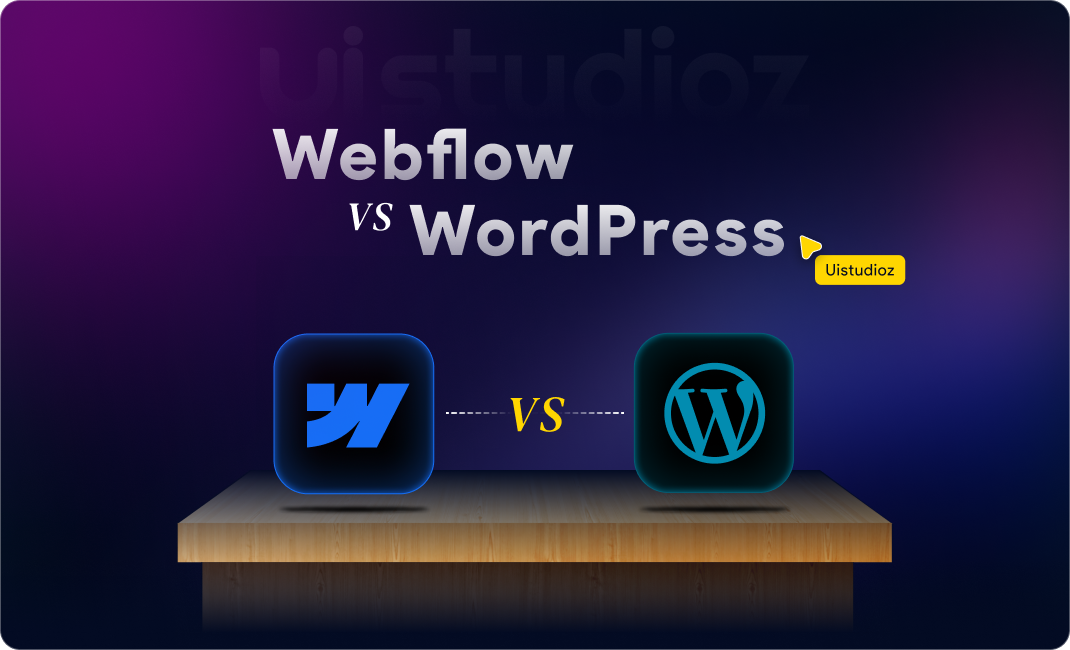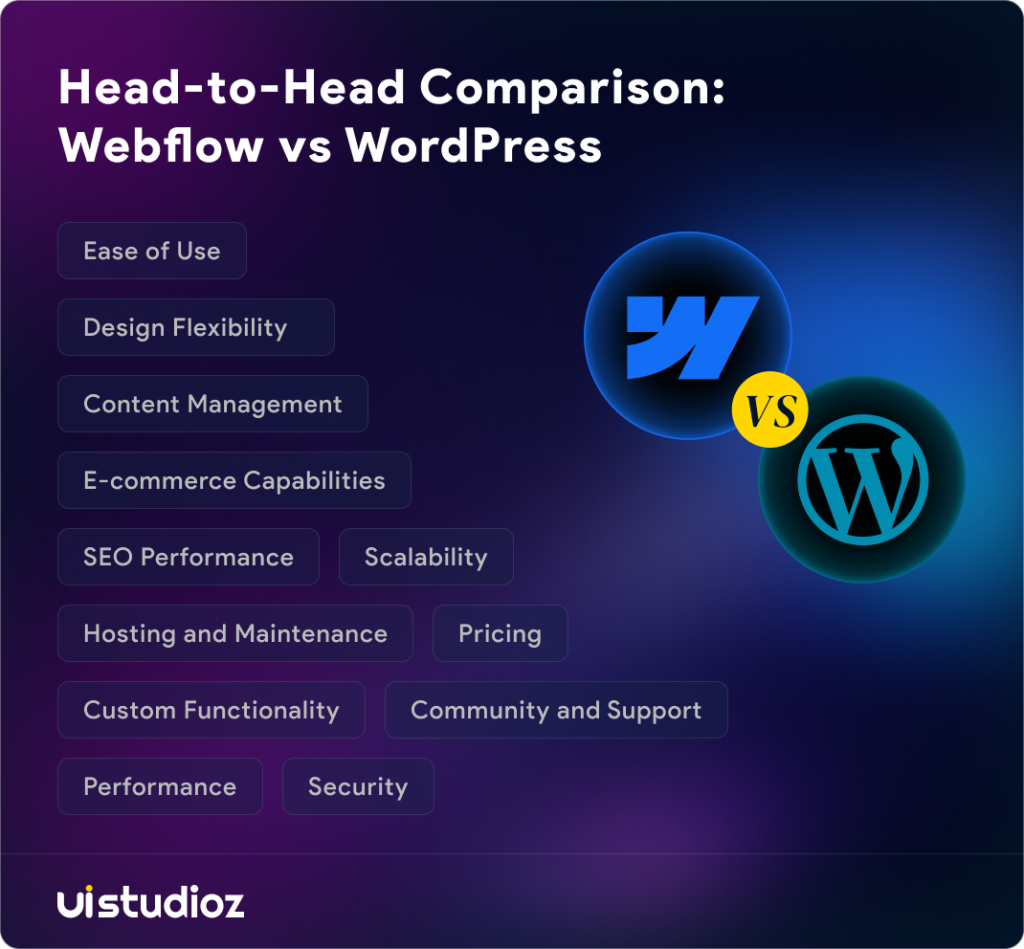Webflow vs WordPress: Which is Right for Your Project in 2024?

The Web Design Platform Dilemma
In the ever-evolving digital landscape of 2024, “Webflow or WordPress?” has become more pertinent than ever. As businesses and individuals seek to establish or upgrade their online presence, choosing between these two popular platforms can significantly impact their digital strategy. Whether you’re a startup, a growing business, or an established brand, understanding the nuances of Webflow vs WordPress is crucial for making an informed decision.
Webflow is a web design and webflow development platform that allows users to design, build, and launch responsive websites visually without writing code. It combines the power of a visual design tool with a CMS’s flexibility and the hosting platform’s reliability.
The Rise of Modern Web Design Platforms
Before we dive into the Webflow vs WordPress debate, let’s look at some revealing statistics that highlight their positions in the market:
- WordPress continues to dominate, powering approximately 43% of all websites in 2024.
- Webflow, while having a smaller market share, has seen substantial growth, boasting over 3.5 million users and attracting major brands like Dell, Upwork, and Rakuten.
These numbers set the stage for our comparison of Webflow vs. WordPress, illustrating WordPress’s strong foothold and Webflow’s rising popularity.
Webflow: Empowering Visual Design
Webflow is a visual web design tool that allows designers to create responsive websites without coding. Its approach bridges the gap between design and development, offering a unique Webflow vs WordPress comparison solution.
Key Features:
1) Visual CSS styling and layout design
2) Responsive design tools with flexbox and grid systems
3) CMS and dynamic content capabilities
4) Built-in hosting and SSL
5) E-commerce functionality
6) Interactions and animations
7) Custom code integration
8) Collaboration tools
Pros:
A) Precise design control
B) No coding is required for most tasks
C) All-in-one solution (design, CMS, hosting)
D) Responsive design made easy
F) Clean, semantic code output
Cons:
A) Steeper learning curve
B) Higher pricing for advanced features
C) Limited plugin ecosystem compared to WordPress
WordPress: The Versatile Content Management System
WordPress, a stalwart in the CMS world, has evolved from a simple blogging platform to a comprehensive web development solution. In the WordPress vs Webflow comparison, it stands out for its flexibility and extensive ecosystem.
Key Features:
1) Extensive plugin ecosystem (over 59,000 free plugins)
2) Customizable themes
3) User-friendly content management
4) SEO-friendly structure
5) Large community and support network
6) REST API for headless CMS capabilities
7) Multi-site functionality
8) Gutenberg block editor
Pros:
A) Highly flexible and customizable
B) Vast array of plugins and themes
C) Strong community support
D) Cost-effective for basic websites
E) Regular updates and improvements
Cons:
A) May require coding knowledge for advanced customization
B) Performance can suffer with too many plugins
C) Security concerns, if not properly maintained
Head-to-Head Comparison: Webflow vs WordPress
Now, let’s compare Webflow and WordPress in detail across various aspects of web development and management.

1. Ease of Use
When considering Webflow or WordPress, ease of use is a crucial factor. Webflow’s visual interface provides immediate feedback on design changes, which can be intuitive for designers but has a steeper initial learning curve. WordPress is generally easier for beginners, especially for basic content management tasks, but may require coding knowledge for advanced customization.
2. Design Flexibility
In the Webflow vs WordPress design showdown, Webflow offers pixel-perfect design control without coding. WordPress relies on themes and page builders, which have become sophisticated but may not match Webflow’s precision without custom coding.
3. Content Management
WordPress shines in content management with its robust backend optimized for creating, organizing, and publishing content. Webflow’s CMS is deeply integrated with the design process but may feel less intuitive for those accustomed to traditional CMS interfaces.
4. E-commerce Capabilities
Webflow offers native e-commerce solutions with visual product management. WordPress relies on plugins like WooCommerce, offering more extensibility for complex e-commerce setups.
5. SEO Performance
Regarding WordPress vs Webflow SEO, both platforms offer strong capabilities. Webflow generates clean, semantic code beneficial for SEO and provides built-in SEO tools. WordPress is inherently SEO-friendly and offers powerful plugins like Yoast SEO, giving it a slight edge.
6. Hosting and Maintenance
Webflow provides all-in-one hosting solutions with automatic updates and backups. WordPress requires separate hosting and more hands-on maintenance, offering more control but requiring more technical knowledge.
7. WordPress vs Webflow Pricing
Webflow’s pricing is based on features and traffic, with plans ranging from free to enterprise-level. WordPress software is free, but costs can accumulate through premium themes, plugins, and hosting. For a detailed breakdown, you might want to search for “WordPress vs Webflow pricing” to find the most current information.
8. Scalability
Both platforms can handle growth but in different ways. Webflow has improved its scalability with enterprise-level plans, while WordPress can scale to handle sites of any size and complexity.
9. Custom Functionality
WordPress excels in custom functionality through its vast plugin ecosystem. Webflow allows for custom code integration but has a more limited ecosystem of third-party integrations.
10. WordPress vs Webflow Performance
Webflow sites perform well out of the box due to optimized code and hosting. WordPress performance can vary greatly depending on hosting, theme choice, and plugins used, but it can be optimized quickly with proper expertise.
11. Security
Webflow handles security at the platform level, while WordPress security requires more active management and regular updates.
12. Community and Support
WordPress boasts a massive community with countless resources. Webflow offers excellent documentation and support but has a smaller, albeit growing community.
Which One is Better, Webflow or WordPress?
The question “Which one is better, Webflow or WordPress?” doesn’t have a one-size-fits-all answer. The best choice depends on your specific needs, resources, and goals. Here are some scenarios to consider:
Choose Webflow if:
1) You prioritize design and want precise control without coding
2) You prefer an all-in-one solution with hosting included
3) You’re creating a site with complex animations and interactions
4) You want a platform that generates clean code out of the box
Choose WordPress if:
1) You need a highly customizable and flexible platform
2) You’re creating a content-heavy site or blog
3) You require specific functionality that’s available through WordPress plugins
4) You have development resources to handle customization and maintenance
Making the Right Choice: Factors to Consider
When deciding between Webflow and WordPress, consider:
1) Your project requirements and complexity
2) Design priorities and level of control needed
3) Content management needs
4) E-commerce requirements
5) The technical expertise of your team
6) Budget constraints
7) Long-term scalability needs
8) Desired level of customization and functionality
How Our Agency Can Guide Your Decision
As a web design and development agency experienced in both Webflow and WordPress, we understand the nuances of each platform. We’ve successfully delivered projects on both, tailoring our approach to each client’s needs.
Our team can:
1) Assess your project requirements in detail
2) Recommend the most suitable platform based on your specific needs
3) Develop custom solutions that leverage each platform’s strengths
4) Provide ongoing support and maintenance
5) Offer training for your team on the chosen platform
Crafting Your Web Presence with the Ideal Platform
In the 2024 Webflow vs. WordPress debate, both platforms have strengths. Webflow excels in design-centric projects where visual precision and built-in hosting are priorities. WordPress offers unparalleled flexibility and a vast ecosystem of plugins and themes and is ideal for content-heavy sites or projects requiring extensive customization.
The right choice depends on your specific needs, resources, and goals. By carefully considering the factors we’ve discussed and leveraging expert guidance, you can make an informed decision that sets your web project up for success.
Ready to bring your web project to life? Contact our expert team today for a personalized consultation on choosing between Webflow and WordPress. Let us help you create a stunning, functional website that meets your unique goals and elevates your online presence in 2024 and beyond.
